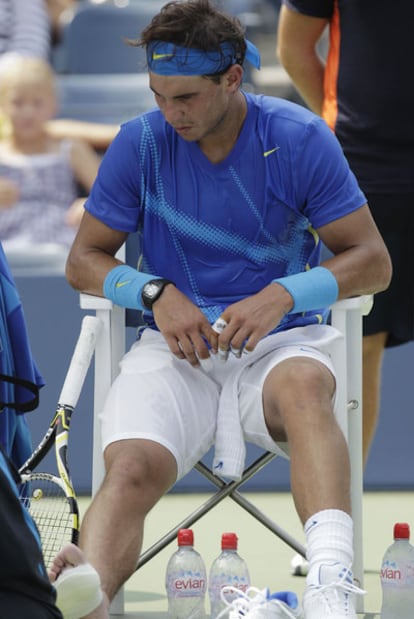Players to Shanghai ATP Tour?
Strike action threat looms over complaints about length of season
The rumblings began at the US Open, as leaden skies forced the loss of almost two days' play, leading to a war of words between players and the organizer of the event, USTA, which was accused of trying to ensure a few rallies were played to avoid a raft of refunds. On Louis Armstrong, where Rafa Nadal was playing Gilles Müller, an ark may have been of use, the Spaniard eventually storming off the slippery surface under a very dark cloud of his own.
"It's always the same," he told US Open supervisor Brian Earley. "You only think about the money."
With the serious business of the season drawing to a close - two Masters 1000 events, in Shanghai on October 9 and Paris in November, remain - the ATP may also have to start about thinking about the money, but not in the way governing bodies normally enjoy. Feeling exploited and under-protected by the powers-that-be, the players are pondering staging a strike in Shanghai, the highlight of the Asian stretch of the Tour that draws a massive audience.
"It's a possibility," said Andy Murray, who has become something of a spokesman for the unofficial players' union. "I know from speaking to some players they're not afraid of doing it. If we come up with a list of things we want changed, and everyone is in agreement and they don't happen, then we need to have some say in what happens in our sport. At the moment, we don't. We'll sit down and talk to the ATP and the ITF [International Tennis Federation] to see if they will compromise, and if they don't we'll take it from there."
The main issue the players want to address is the increasingly punishing schedule, which obliges them to play for 11 months of the year. In the case of Nadal, whose season began on January 2, the world number two can expect around three weeks off, with the Davis Cup final against Argentina at the start of December, before the calendar obliges him to travel to Australia.
And the issue is scarcely a new one: "The tennis calendar is extremely hard and forces players to compete week in week out, making it impossible for a top-level player to be 100 percent for each event," Nadal said in November 2008, when he was forced to pull out of Shanghai through injury. "When a player pulls out of an event, the tournaments should ring the ATP, not blame the player," the world number two added.
"I've been pretty forthright in my opinions regarding the schedule and it being too long," Andy Roddick, another of the US Open rebels, said of the schedule for 2009. "I think too much is asked of us as far as playing 11 months of the year, and now they're imposing more mandatory tournaments. It doesn't make a whole a lot of sense."
Under current ATP guidelines, top-30 players must compete at the four Grand Slam events, eight Masters tournaments and the ATP Finals, if they qualify. A players' ranking, which determines direct entry and seeding at tournaments, is calculated by results at these events and the best four showings at ATP 500 level and a possible two at 250. One of the mandatory 500 events must be played after the US Open.
The WTA altered its schedule last decade, bringing the season to a close on November 7. "We just want small things to change, two or three weeks a year, a few less tournaments, which I don't think is unreasonable," said Murray.
But Michael Stich, a former Wimbledon champion, gave Murray's argument short shrift: "He doesn't even play four rounds of Davis Cup each year," the German told the BBC. "I think players forget the tournaments provide them with jobs. They have a shorter season than we used to have. I played singles and doubles and guys like Stefan Edberg played singles and doubles at Grand Slams and they never complained. They loved it, it was their job. [Today's players] are not playing more than 10 or 15 years ago. It's like they are running after exhibition matches; they are trying to make more money and don't even fulfill their commitments to the smaller tournaments."

Tu suscripción se está usando en otro dispositivo
¿Quieres añadir otro usuario a tu suscripción?
Si continúas leyendo en este dispositivo, no se podrá leer en el otro.
FlechaTu suscripción se está usando en otro dispositivo y solo puedes acceder a EL PAÍS desde un dispositivo a la vez.
Si quieres compartir tu cuenta, cambia tu suscripción a la modalidad Premium, así podrás añadir otro usuario. Cada uno accederá con su propia cuenta de email, lo que os permitirá personalizar vuestra experiencia en EL PAÍS.
¿Tienes una suscripción de empresa? Accede aquí para contratar más cuentas.
En el caso de no saber quién está usando tu cuenta, te recomendamos cambiar tu contraseña aquí.
Si decides continuar compartiendo tu cuenta, este mensaje se mostrará en tu dispositivo y en el de la otra persona que está usando tu cuenta de forma indefinida, afectando a tu experiencia de lectura. Puedes consultar aquí los términos y condiciones de la suscripción digital.








































